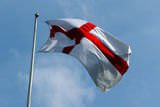England is a part of Great Britain. Its inhabitants account for more than 83% of the total UK population, whilst its mainland territory occupies most of the southern two-thirds of the island of Great Britain. The island of Great Britain consists of England, Scotland and Wales.
In the early 18th century, Scotland signed an Act of Union with England to create the United Kingdom of Great Britain. Scotland is getting ready to hold a referendum on whether they want to become an independent nation and secede from the UK.[1]
Comparison chart
| | England | Great Britain |
|---|---|---|
 |  | |
| Currency | Pound sterling (£) (GBP) | Pound sterling (£) (GBP) |
| Time zone | GMT (UTC+0) | GMT (UTC+0) |
| Demonym | English | British, Britons |
| Calling code | +44 | +44 |
| Introduction (from Wikipedia) | England is a country, which is part of the United Kingdom. Its inhabitants account for more than 83% of the total UK population, whilst its mainland territory occupies most of the southern two-thirds of the island of Great Britain. | Great Britain is the larger of the two main islands of the British Isles, the largest island in Europe, the 9th-largest island in the world and the 3rd most populated island on earth. It is also the second richest island in the world (after Japan). |
| Government | Governed by the UK's centralised Parliamentary democracy and Constitutional monarchy | Parliamentary democracy and Constitutional monarchy |
| Official languages | English | English (de facto) |
| Capital (and largest city) | London 51.5074° N, 0.1278° W | London |


 Great Britain
Great Britain  England
England
Comments: England vs Great Britain